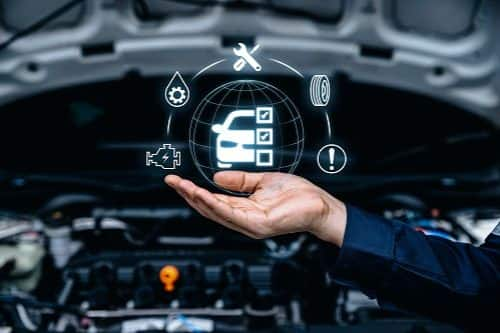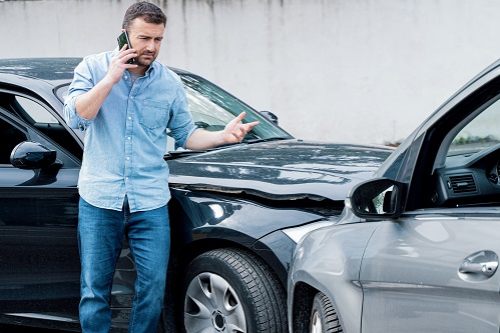- What happens if you total a financed car with full coverage insurance?
- How does full coverage insurance work if the car is totaled?
- Does full coverage pay off a totaled car?
- What does full coverage actually cover in a totaled car scenario?
- How to buy a new car after a total loss
- How does gap insurance work in the case of a totaled car with full coverage?
- Frequently asked questions
What happens if you total a financed car with full coverage insurance?
If you total a financed car, what happens next depends partially on who is at fault for the accident. Here’s a look at what happens when a car is totaled:
- You should immediately file an accident report with the police and with your insurance company. If the damage is due to a non-collision event, you will file a police report only if a crime was involved.
- The insurance company will review the damage and determine if it results in a total loss.
- In an accident scenario, it will be determined who is at fault, you or the other driver.
- If you are at fault, the claim will be paid by your insurance company through your collision coverage. If the other driver is at fault, their liability insurance will pay the claim.
- An insurance adjuster will determine the actual cash value of your car. This may not cover what you still owe on your loan or finance agreement.
- If you have gap insurance – which covers the difference between the ACV and what you owe – you’ll need to file a separate claim.
- The insurance company sends the check directly to the finance company.
How does full coverage insurance work if the car is totaled?
Depending on the type of damage to your car, your full coverage insurance works in a couple of different ways. The cause of the damage determines whether comprehensive or collision coverage will be applied.
Total loss with comprehensive coverage
If the damage is from a non-collision event like vandalism, hail, fire or theft, comprehensive coverage kicks in. Comprehensive also covers a collision with an animal or something falling on your car, like a tree branch. You will be responsible for your deductibleThe deductible is the amount you pay out of pocket for a covered loss when you file a claim..
Total loss with collision coverage
If the damage to your car was from an accident, whether with another car or a single-vehicle incident like a rollover, collision coverage comes into play. Collision pays for the damage minus your deductible.
Collision coverageCollision coverage helps pay for repairs or replacement of your car if it's damaged in an accident, regardless of who is at fault and is subject to a deductible. may apply regardless of fault, but if another insured driver is at fault, their insurance should pay for your car. In the event of an accident with a driver who isn’t insured or doesn’t have enough insurance to cover the damage, uninsured/underinsured motorist coverage may kick in instead.
Does full coverage pay off a totaled car?
The insurance company will pay the actual cash value of the car. If you owe more to your finance company than the car is worth, you are responsible for the remainder unless you have gap insurance.
The ACV is determined based on the vehicle’s age, make and model, mileage and pre-crash condition.
For example, say you still owe $25,000 on your car loan. You get in an accident, and your car is totaled. Your insurance company covers you, but only for the car's ACV, which is determined to be $21,000. You have a $500 deductible, which is subtracted from the payout. They will pay your finance company $20,500. You are responsible for the remaining $4,500.
If someone else is found at fault for the accident, their insurance will issue the check. In the meantime, keep up with your car payments so your good credit stays intact.
In both cases, unless you have gap insurance, you’re responsible for any balance due to your finance company that the insurance payout doesn’t cover.
What does full coverage actually cover in a totaled car scenario?
In a total-loss scenario, full coverage insurance will pay for the car. Full coverage insurance has a lot of definitions, but in most cases it refers to a policy that includes coverage for physical damage to your car.
It also includes all legally required coverages, including liability, and, in some states, personal injury protectionPersonal injury protection (PIP) pays for your medical, hospital and funeral expenses resulting from a car accident, regardless of who's at fault. (PIP), medical payments and uninsured motorist coverage.
If you have full coverage and your car is totaled, what it covers depends on what happened and who is at fault. Here’s a look at what you can expect to be covered in an at-fault accident or non-collision event where another driver’s policy isn’t involved:
- The actual cash value of your car
- Sales tax, if required by law in your state
These might be included if you carry additional coverage, but they are not part of comprehensive or collision insurance:
- Towing fees
- A rental car
Here’s what full coverage insurance won’t cover:
- Your deductible
- Impound fees
- The difference between your car’s ACV and what you owe
- The difference between your car’s ACV and what you decide to spend on a new car
How to buy a new car after a total loss
If your car was a total loss, you’ll need to find a replacement. If you had owned the car outright, you would receive the settlement check and could use it toward the purchase of a new car. However, in the case of a financed car, the settlement check will go to pay off your loan, and you won’t have cash toward a purchase.
Try working with the same finance company to get a new loan since you have a credit history with them. This is why keeping up with any payments throughout the insurance claims process is key.
Now is the time to shop around for cars, car loans and possibly new insurance, using car loan and insurance calculators. Consider adding gap coverage if you decide to finance a new car, especially if you don’t have much of a down payment.
“I always recommend that if you are financing a new vehicle, obtain gap coverage [either through the dealer or your insurance agent],” O’Neil says.
How does gap insurance work in the case of a totaled car with full coverage?
If you have gap insurance as well as full coverage insurance, here’s how it will work.
- Put in a claim with your car insurance company. The insurance company will determine the value of the vehicle and offer you a settlement, which you can accept or negotiate. Once a settlement is determined, you will know what you owe on the loan.
- File a claim with your gap insurance carrier and show them all the paperwork from your car insurance claim.
- The gap insurance carrier will issue a check to your finance company for the remainder of what’s owed on your vehicle. “This will cover the gap [between] what your car is worth at the time of the accident and how much you still owe on your loan,” O’Neil says.
When you buy a new car, you’ll need to obtain new gap insurance.
Frequently asked questions
What happens if you total a financed car with no coverage?
It’s very unlikely that you wouldn’t have insurance as most lenders and finance companies require full coverage. Moreover, it is illegal to drive without coverage. If you are uninsured, however, you must keep making your car payments or find another way to pay off the loan.
Will my insurance rates increase after totaling a car?
Maybe. Your rates will increase after totaling a car if you were at fault. An at-fault accident with a total loss will cause a rate increase that varies by carrier and location.
What should I do if I still owe money after the payout?
If you still owe money after the payout, keep up with the monthly payments. You don’t want to ruin your credit score. If you're having trouble, talk to the finance company and see if you can get a new vehicle and roll the old amount owed into a new loan.





